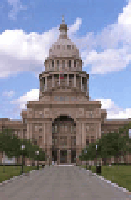|

|
 |
Texas Supreme Court Rules Current Public
School Funding System Unconstitutional On Tuesday, November 22, the Texas Supreme Court released it much anticipated ruling on the case regarding Public School Funding. Basically, the court upheld Judge Dietz’s ruling that the current method of funding our schools is unconstitutional and must be replaced by June 1, 2006. However, the Supreme Court overruled the original opinion that dealt with the level or amount of adequate funding. According to the ruling, Texas school districts illegally tax property owners to pay for public education, and the state must find a new way to fund schools by June 1 or classrooms will remain closed in the fall. Texas' highest civil court ruled that the property taxes for schools have become an unconstitutional statewide property tax and charged lawmakers with repairing the $30 billion funding system. State funding would be stopped if the deadline isn't met. The nine-member Republican panel agreed 7-1 with one of three arguments in a lawsuit brought against the state by hundreds of school districts, but found the system meets constitutional requirements for "adequate education" and equitable facilities funding. Justice Scott Brister dissented and Justice Don Willett did not participate. June 1 is an extension of an earlier court deadline set in the long-running case, and one lawmaker said it this one is much more serious. "This time the Supreme Court has ruled. There is no back door," said Texas Rep. Dan Branch, R-Dallas, a member of the House Public Education Committee. "This deadline is a real, hard, firm deadline. At that point, you can't finance schools the same way, you have to make the system constitutional, otherwise you run the risk of not being able to open schools in August." The court declined to offer its own solution, pushing the issue back to lawmakers. Republican Gov. Rick Perry praised the ruling and said he plans to call lawmakers back to Austin to take up the issue in a special legislative session "at an appropriate time before that deadline." The court has been considering the case for months on appeal from a district court in Austin. Property-rich and poor districts sued, claiming the method for funding education did not meet requirements set in the state constitution. State District Judge John Dietz in September 2004 agreed. He ordered that the three problems get repaired or the state would have to halt funding for schools Oct. 1. That deadline was suspended pending the high court ruling. The state appealed to the Supreme Court, arguing that changes to the system should be made by the Legislature, not the courts. The Supreme Court agreed with the plaintiffs' argument that the system is unconstitutional because so many school districts are forced to tax property owners at the maximum limit of $1.50 per $100 in property value. That amounts to a statewide property tax because districts don't have room to set their own rates, the high court ruled. Districts argued that to fund all state and federal education mandates -- such as the 22-student per class limit and minimum teacher salaries -- they must tax at the legal limit. The property tax cap, they said, had become both a minimum and a maximum rate. Perry has appointed former comptroller John Sharp, a Democrat and former political rival, to head a commission that will recommend how to restructure the tax system that pays for schools. It met for the first time Monday. The Governor has not made an announcement on when he will call the legislature back to Austin to deal with this matter, but many political handicappers are predicting that it will be in April of 2006. It is unclear at this point what will be allowed for consideration by the legislature and whether or not the Texas racing industry will have an opportunity to present its legislative solutions. |
| Back to News |
BENEVOLENCE | BENEFITS | GROOM ELITE | PERSONNEL | LINKS | CONTACT US
